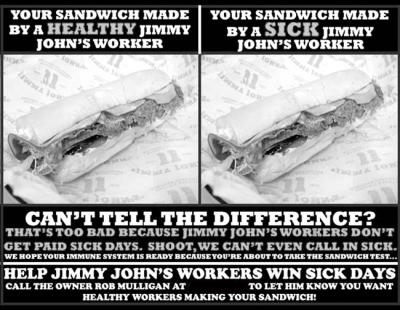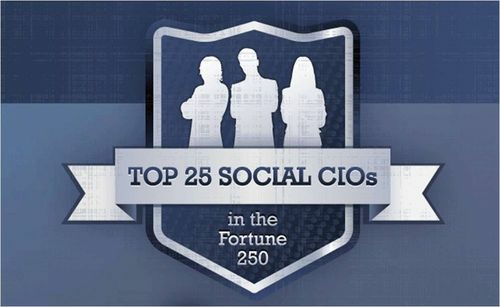More Fake Twitter Followers Than You May Think
I'm so naive. Turns out, about 30% of ESPN's, CNN's, and Lady Gaga's Twitter followers are fake. Of Twitter's own followers, only 23% are considered "good": neither fake nor inactive. An infographic compiled by Social Selling University gives us a few examples.
According to Status People, a social media management company, "at least 11,283 Twitter users have purchased more than 72,000 fake followers." Followers are easy to buy: a Google search reveals many companies willing to sell you fake followers at the bargain price of $2 and $55 per 1,000. However, The New York Times reported one example of a marketing company buying 250,000 for just a penny each.
The pricier options look more authentic than the cheaper versions. To make Twitter profiles appear real, sellers follow real and random people and post tweets.
With its "Fake Follower Check," Status People will tell you how many fake and real followers you and others have on Twitter. Both President Obama and Mitt Romney have bought their share of followers, according to Social Selling University.
Twitter is cracking down on fake followers, but at least for now, the practice persists.
Discussion Starters:
- If you wanted to garner support for your Twitter feed, would you consider buying followers? Why or why not?
- What does having fake followers do to the credibility of Twitter? Do you think this practice is a serious threat, no big deal, or something else?
- Do you consider the practice ethical? Why or why not?
Urban Outfitters' 11 Missteps
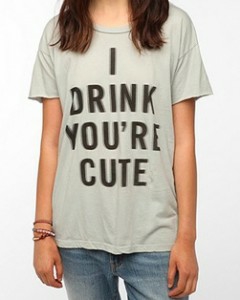 The Week has chronicled 11 "controversies" of Urban Outfitters in the past few years.
The Week has chronicled 11 "controversies" of Urban Outfitters in the past few years.
The most recent is the company's new t-shirts that some say promote drinking. With slogans such as "I Love Vodka," "USA Drinking Team," and "Misery Loves Alcohol," Urban Outfitters is targeting its main demographic, 18- to 24-year-olds. MADD (Mothers Against Drunk Driving) has taken a strong stance against the product line. The group's president, whose daughter was killed by a intoxicated, underaged driver, said, "Kids shouldn't be wearing these t-shirts."
The Week tallies other questionable products:
- A t-shirt offered in two colors: "White/Charcoal" and "Obama/Black." Urban Outfitters responded, admitting "[we] screwed up, and are sincerely sorry," and explaining that they had developed a "Obama Blue" color intended for internal use only.
- A t-shirt that read "Eat Less" and was displayed on a very thin model.
- A "Navajo" line of products, which a member of the Santee Sioux Nation called "distasteful and racially demeaning" in a letter to Urban Outfitters' CEO.
Discussion Starters:
- What's your view of Urban Outfitters' products: clever, insulting, or something else?
- What advice would you give to the company as it develops future products?
High School Valedictorian Offends and Doesn't Get Diploma
Kaitlin Nootbaar said "hell" in her graduation speech, angering the school principal, who refused to give her the diploma without an apology.
In her speech at Prague High School in Oklahoma, Nootbaar told of her challenges in choosing a career path and her tendency to change her plans. Nootbaar said that she responds to questions about her career by saying, "How the hell do I know? I've changed my mind so many times." The quote was inspired by a graduation scene in "Eclipse," of "The Twilight Saga." In the film, Anna Kendrick's character says, "who the hell knows?"
"Heck" was used in the written version of Nootbaar's speech, but she says that she changed to "hell" at the last minute. Still, she didn't know anything was wrong because the crowd responded well.
According to Nootbar's father, when he went to pick up the diploma, "The principal shut the door on us and told us she [Kaitlin] will type apology letters to him, the school board, the superintendent and all of the teachers." Nootbaar's father was angry and said his daughter had received straight As and that she "excelled beyond anything I'd expect ever being my child."
In response to questions by the press, Superintendent Dr. Rick Martin said, "This matter is confidential, and we cannot publicly say anything about it."
Nootbaar explained her perspective to a local newspaper:
"First off, I would like to thank everyone who is backing me on this, especially my friends and family. And to those who don't agree with me, that is fine also. Everyone is entitled to their own opinion and is free to comment however they choose. It's one of the great advantages of living in a free country. A country where we are free to speak. I would also like to note that I do not hate Prague. I have loved that town since I was a child. I don't hate the school either, the teachers have always been great! I don't feel that the whole town should suffer from the mistakes of few. Again, thanks:)"
Discussion Starters:
- What are the communication barriers in this situation?
- What are Kaitlin Nootbaar's and the principal's responsibilities here?
Who Topped Olympics Social Media Conversations?
Using data from 150 million sources, Salesforce Radian6 tracked social media conversations about the Olympics on Twitter, Facebook, YouTube, and others sites.
The chart shows social media mentions of the top medal-winning countries during the second week of the Olympics. Consistent with the number of wins in the actual games, the United States ranks first.
From a business communication perspective, the chart is rather easy to understand, but it can be improved. Also, at least one description of the chart is questionable:
"But Great Britain, fourth in the medal standings, surges to the second spot in social media mentions."
For participants, the press, and others writing about the games, the International Olympic Committee published social media guidelines. The guidelines encourage social media participation and explain acceptable uses of photographs and trademark symbols. As expected, the guidelines warn writers about violations of policy:
"The IOC will continue to monitor Olympic on-line content to ensure that the integrity of rights-holding broadcasters and sponsor rights as well as the Olympic Charter is maintained. The IOC asks for the support of all participants and other accredited persons in halting any ambush activity or any sites engaged in conduct which is offensive to or adversely affects the goodwill associated with the Olympic Games and the Olympic Movement. The IOC asks that participants and other accredited persons discovering unauthorised content, please report it immediately to www.olympicgamesmonitoring.com."
As we know from some examples, not everyone respected these guidelines.
Discussion Starters:
- In what ways can the chart be improved to improve readability and accuracy?
- What is potentially questionable about the article quote, above, about Great Britain? How should this be fixed?
- How effective are the social media guidelines? What, if anything, would you suggest that the International Olympic Committee change for next year?
Man Fired for "Berating" Chick-fil-A Employee
Public opinion rages on after Chick-fil-A's CEO said he supported "the biblical definition of the family unit." First, we heard outrage from supporters of gay marriage and saw the company's softened stance on the issue.
The saga continues as one man wanted to tell a Chick-fil-A employee-at a drive-through window-how he felt. Adam Smith, the (former) CFO of Vante, a medical supplies manufacturer, posted a video of the interaction on YouTube. Smith ordered a free water, referred to Chick-fila-A as "a horrible corporation with horrible values," and told the employee, "I don't know how you live with yourself and work here."
Vante didn't appreciate Smith's behavior or the publicity and fired the CFO. In response, Smith posted another video in which he apologizes to the employee; refers to her "beauty," "kindness," and "patience" in dealing with him; and explains that he "lost it." He said, "You should be very proud of how you handled the stressful situation. Great job. Wow."
Vante issued this statement to explain the decision to terminate Smith:
"Vante regrets the unfortunate events that transpired yesterday in Tucson between our former CFO/Treasurer Adam Smith and an employee at Chick-fil-A. Effective immediately, Mr. Smith is no longer an employee of our company.
"The actions of Mr. Smith do not reflect our corporate values in any manner. Vante is an equal opportunity company with a diverse workforce, which holds diverse opinions. We respect the right of our employees and all Americans to hold and express their personal opinions; however, we also expect our company officers to behave in a manner commensurate with their position and in a respectful fashion that conveys these values of civility with others.
"We hope that the general population does not hold Mr. Smith's actions against Vante and its employees."
An article in Bloomberg Businessweek gives us a legal perspective on this situation and others: "Where Free Speech Goes to Die: The Workplace." The author explains:
"In America you can say pretty much whatever you want, wherever you want to say it. Unless, that is, you're at work. Simply put, there is no First Amendment right to 'free speech' in the workplace-potentially perilous for many employees in a polarized political year with a tight presidential race."
Mark Trapp, an employment lawyer further clarifies the limitation of "free speech":
"The First Amendment applies only to employees of the government in certain situations, and all citizens when they're confronted by the government."
Discussion Starters:
- Did Smith's boss do the right thing? What are the arguments for firing him and for keeping him employed?
- How do you assess the Chick-fil-A employee's reaction to Smith? Did she handle the situation well?
Companies' Green Claims Count More than Actions
 A recent study concludes that companies' messages about environmental actions have a more positive effect on market value than do positive actions themselves. Or, as one article put it, "...greenwashing is better than being green."
A recent study concludes that companies' messages about environmental actions have a more positive effect on market value than do positive actions themselves. Or, as one article put it, "...greenwashing is better than being green."
The study, "Do Actions Speak Louder than Words? The Case of Corporate Social Responsibility (CSR)," analyzed data from 2,261 firms in 43 countries from 2002 to 2008. Authors from Fuqua School of Business and the London Business School explored the conditions under which CSR (corporate social responsibility) affects financial performance. According to Environmental Leader, the study found the following:
"The authors found symbolic actions have a higher impact on market value than substantive actions, when the company has higher CSR-based assets. The study also concluded that a larger gap between symbolic and substantive actions has a higher positive impact on firm performance; and the more companies engage in both symbolic and substantive actions, the higher the value accumulates to the company."
The Environmental Leader further describes the distinction between "symbolic" and "substantive" actions:
"Symbolic actions include any ceremonial conformity or compliance: for example, a company announcing plans to form a sustainability or corporate ethics committee to provide the appearance of an action, without necessarily having any substance. Symbolic actions can be more generally described as 'window dressing' or greenwashing – essentially anything designed to give an appearance of an action while allowing business to proceed as usual.
"Substantive actions are the real actions taken by an organization to meet certain expectations and often require changes in core practices, long-term commitments and investments in corporate culture."
The paper is consistent with a Deloitte report that companies' communication about CSR practices impacts the bottom line.
Discussion Starters:
- What's your view of greenwashing for the purpose of improvement corporate financial performance? Is it ethical? Why or why not?
- If you were the CEO of a Fortune 500 company, how, if at all, would you use the results of this study?
Judge Rules that Tweets Are Public Speech
A judge has ruled that an Occupy Wall Street protester's tweets must be turned over. Judge Matthew A. Sciarrino Jr. said that tweets are not protected as private speech; rather, they are considered public comments. The judge wrote:
"The Constitution gives you the right to post, but as numerous people have learned, there are still consequences for your public posts. What you give to the public belongs to the public. What you keep to yourself belongs only to you."
The judge also wrote, "If you post a tweet, just like if you scream it out the window, there is no reasonable expectation of privacy."
The decision came out of a court case that subpoenaed the protestor's deleted tweets. Both the protestor and Twitter tried to block to subpoena. Twitter issued a statement about the decision, which included this excerpt:
"Twitter's terms of service have long made it absolutely clear that its users own their content. We continue to have a steadfast commitment to our users and their rights."
Twitter also published its first "Transparency Report," showing the number of government requests for user information and what percentage of those requests were fulfilled.
Image source. (Protestors arrested on the Brooklyn Bridge in October.)
Discussion Starters:
- Does the judge's decision surprise you? Why or why not?
- What are the implications of this decision to company communicators? To you personally?
NLRB Weighs in on Social Media Policies
What should companies include in their social media policies? The topic is still debatable; again, the National Labor Relations Board is taking issue with several restrictions identified in corporate policies and guidelines.
In a 24-page memo, the general counsel of the NLRB calls out General Motors, DISH Network, and Target as having policies that either too severely restrict employees' online activities or go so far as violate the National Labor Relations Act. The Act protects employees' right to collective bargaining and concerted activity to achieve their demands in the workplace.
The memo provides examples from GM's policy, which the NLRB believes are overly restrictive:
"If you engage in discussion related to [GM], in addition to disclosing that you work for [GM] and that your views are personal, you must also be sure that your posts are completely accurate and not misleading and that they do not reveal non-public company information on any public site."
The NLRB believes that "completely accurate and not misleading" is overly broad and may restrict employees' communication with each other. Similarly, GM's warning that employees should "[t]hink carefully about 'friending' co-workers" discourages employee communication.
DISH and Target have other problems in their policies, according to the NLRB, for example, restricting employees from speaking with reporters and bloggers, and "releas[ing] confidential guest, team member, or company information, respectively. These guidelines prevent employees from sharing information about their working conditions, a provision of the Act.
The memo highlights Walmart's social media guidelines as a lawful model. Walmart's guidelines broadly discourage "inappropriate postings that may include discriminatory remarks, harassment, and threats of violence or similar inappropriate or unlawful conduct."
Discussion Starters:
- Assess the NLRB memo. How well is it organized? Is the writing style effective? Is the content clear?
- If you were the head of corporate communication for GM, what, if any, changes would you make to the social media policy, which has been in place since 2007, according to GM spokesperson Mary Henige?
LinkedIn Responds to Password Hacking
It's time to change your LinkedIn password. A Russian forum user posted 6.5 million passwords from the site, and LinkedIn has confirmed their authenticity. The hacker also claims that he stole 1.5 million eHarmony passwords.
LinkedIn has responded to the incident with this post on its website:
We want to provide you with an update on this morning's reports of stolen passwords. We can confirm that some of the passwords that were compromised correspond to LinkedIn accounts. We are continuing to investigate this situation and here is what we are pursuing as far as next steps for the compromised accounts:
- Members that have accounts associated with the compromised passwords will notice that their LinkedIn account password is no longer valid.
- These members will also receive an email from LinkedIn with instructions on how to reset their passwords. There will not be any links in this email. Once you follow this step and request password assistance, then you will receive an email from LinkedIn with a password reset link.
- These affected members will receive a second email from our Customer Support team providing a bit more context on this situation and why they are being asked to change their passwords.
It is worth noting that the affected members who update their passwords and members whose passwords have not been compromised benefit from the enhanced security we just recently put in place, which includes hashing and salting of our current password databases.
We sincerely apologize for the inconvenience this has caused our members. We take the security of our members very seriously. If you haven't read it already it is worth checking out my earlier blog post today about updating your password and other account security best practices.
LinkedIn has been active on Twitter, with four tweets so far about the incident.
Discussion Starters:
- The company's communication process via email is a bit complex. Do you understand why the management team chose this process? Would you propose a better process?
- This paragraph could be written more clearly: "It is worth noting that the affected members who update their passwords and members whose passwords have not been compromised benefit from the enhanced security we just recently put in place, which includes hashing and salting of our current password databases." What changes would you suggest to the writer?
Twitter: Flat Percentage of Users, but Deeper Engagement
New research shows that only 15% of online adults use Twitter, and only 8% use the service every day. Although the percentage of users remains fairly stable and is fairly small, the number of daily users has doubled since May 2011 and quadrupled since late 2010. 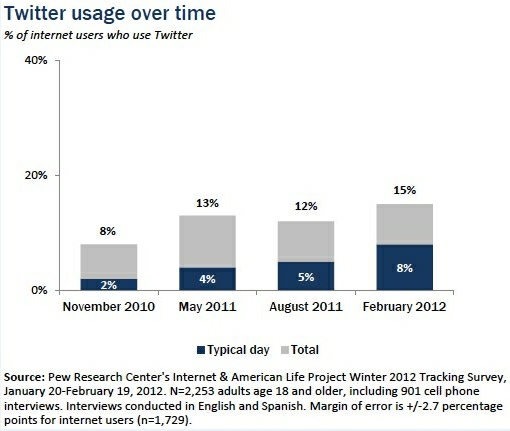
Authors of the February 2012 Pew Research Center's report credit smartphones with the increase in usage. According to Aaron Smith, Pew senior research specialist, "I do think it's notable that typical day Twitter usage is growing even as the overall usage stats have remained fairly consistent, [which] would imply that existing Twitter users are growing more engaged over time, with mobile being a big part of that story."
It took a while, but younger users are getting onboard with Twitter. Between November 2010 and February 2012, the percentage of Internet users between 18 and 24 on Twitter has increased from 16% to 31%. In addition, one in five in this age group uses Twitter.
Discussion Starters:
- Read the Pew report. What other conclusions can you draw from the study?
- What is your own use of Twitter? If you fit within the category of growing users, why has your usage increased?
- How is this new information relevant to corporate communicators?
U.S. Presidential Candidates Go Social
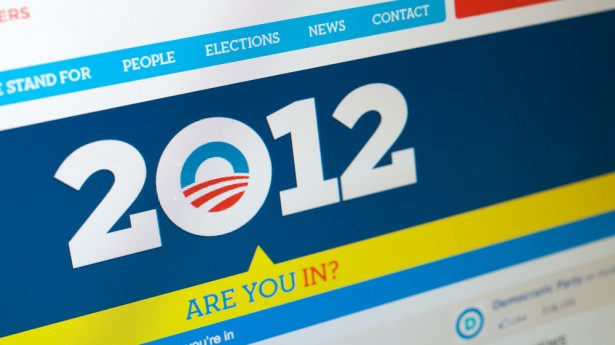 President Obama and Republican contender Mitt Romney are using social networking to boast their campaigns. Today, the Obama campaign is releasing a new platform called "Dashboard." Katie Hogan, spokesperson for the campaign, described the purpose of Dashboard:
President Obama and Republican contender Mitt Romney are using social networking to boast their campaigns. Today, the Obama campaign is releasing a new platform called "Dashboard." Katie Hogan, spokesperson for the campaign, described the purpose of Dashboard:
"Dashboard is our online field office - a hub for campaign volunteers and supporters to communicate with each other and become members of neighborhood teams. . . .
"Supporters can use the tool to set goals, communicate those goals, and see what other supporters are doing. Supporters who want to be engaged can go to Dashboard, message other supporters in their area, and have a conversation about how to get started. It provides a good volunteer experience online that is directly tied to our field operation goals."
Built into the system is a keen focus on setting goals and friendly competition among neighborhoods. With a Facebook-like interface, volunteers are expected to use the site easily.
Since the fall, Mitt Romney's campaign has used a different home-grown system, "MyMitt."
Images via Raw Story and Signal News.
Discussion Starters:
- If you supported one of the candidates, would you use his social network? Why or why not?
- Why would both campaigns create their own platform rather than use Facebook as their main tool for volunteers?
- Consider signing up for both sites. What differences do you notice? Which is more effective for what purposes?
Retailer CFO Loses Job Over Social Media Posts
Maybe this is why so few CFOs use social media. Women's clothing retailer Francesca's fired its CFO today for his tweets and Facebook posts that revealed too much about the company.
Francesca's issued a press release announcing the decision but didn't mention which posts, specifically, were of concern. However, the statement said that Gene Morphis had "improperly communicated Company information through social media." Below are two examples of Morphis's Facebook posts.
In another post, Morphis criticized co-sponsors of the Sarbanes–Oxley Act, a law that defines financial reporting standards:
"Audit committee. Damn you Paul Sarbanes! Damn you Michael Oxley!"
Discussion Starters:
- What should be the social media guidelines for corporate CFOs? Should they differ from guidelines for all employees?
- Was the Board right in terminating Morphis?
- What could have been done to prevent this situation?
JPMorgan Chase Loses More than $2B
JPMorgan Chase is trying to explain how the bank lost $2 billion and may lose another $1 billion as it settles a trade. In just six weeks, the bank's Chief Investment Office, a group that invests extra assets to hedge risks, lost this extraordinary amount of money.
In a conference call, Jamie Dimon, CEO of JPMorgan Chase, called the situation "self-inflicted":
"We're accountable, and what happened violates our own standards and principles about how we want to operate the company. This is not how we want to run a business."
Liz Rappaport, a Wall Street Journal reporter on PBS NewsHour questioned the terminology that Dimon used, specifically that the Chief Investment Office was intended as an "economic hedge." According to Rappaport, this was an "unclear thing to say": a hedge typically is used to protect against a specific investment, but "exactly...what this group actually hedges against is unclear, and the fact that this was such a large and outside position in one direction, and they got caught...flat footed with it, also doesn't sound like a hedge-it sounds like a bet." The distinction is important: did the investments hedge against risk or create more risk for the bank?
Rappaport also said that this wasn't really a "rouge trader" situation, as we saw at UBS in September 2011. Rather, at the center of the controversy is a London trader nicknamed the "London Whale" for his large investment positions. Unlike the UBS situation, the Chief Investment Office's trades were apparently "run up the flag pole," according to Rappaport.
Discussion Starters:
- What do you see as the distinction between a "hedge" and a "bet"?
- How do you assess Jamie Dimon's response to the situation?
Jimmy John's Will Rehire Employees Who Put Up Posters
Sandwich restaurant Jimmy John's had disappointing news this week: a federal judge ordered the company to rehire and pay lost wages to six employees. The employees were fired after they posted 3,000 notices implying that sandwiches could be made by sick workers.
The employees claimed that if they called in sick but couldn't find a replacement, they feared being fired. In the court decision, the judge ruled that, by removing the posters, Jimmy John's violated workers' rights under the National Labor Relations Act. This decision was based on a labor dispute under way at Jimmy John's: a union held an election to organize workers and, although the union was narrowly rejected, it filed unfair labor practices, claiming that Jimmy John's interfered with the election process.
The union perspective is that the workers were terminated "for blowing the whistle on company policies that expose customers to sandwiches made by sick workers."
MikLin Enterprises, which owns Jimmy John's, will appeal the decision.
Discussion Starters:
- What is your perspective of the posters? What is the company's perspective?
- How does this case relate to comments in social networking sites, a hotly debated topic for the National Labor Relations Board?
GSA Overspending Scandal: "Aggrieved by the Gall"
The General Services Administration (GSA) is under investigation for spending $823,000 at a Las Vegas conference in 2010. The GSA is responsible for purchasing products, transportation, and office space for other government agencies, and ironically, is charged with developing cost-containment policies.
Martha Johnson, head of the GSA as of February 2010, has resigned amid the controversy. In her testimony to Congress, Johnson admitted that the Western region training conference "evolved into a raucous, extravagant, arrogant, self-congratulatory event that ultimately belittled federal workers and would stain the very work that other committed staff and I were preparing to do." She also said that "[T]he expensive planning for that conference was well under way when I entered GSA, and I was unaware of the scope" and that she was "extremely aggrieved by the gall of a handful of people to misuse federal tax dollars, twist contracting rules and defile the great name of the General Services Administration."
Johnson's strong statement was in sharp contrast to that of Jeffrey Neely, a GSA executive who evoked his Fifth amendment right not to answer any questions. As reported by CNN, Rep. Elijah Cummings of Maryland criticized Neely specifically:
"'In one e-mail...Mr. Neely invited personal friends to the conference, writing, and I quote -- and this is simply incredible -- quote: "We'll get you guys a room near us, and we'll pick up the room tab. Could be a blast." End of quote. He then went on and wrote this -- "I know I'm bad, but as Deb and I often say, why not enjoy it while we have it and while we can. Ain't gonna last forever." End of quote. Well, Mr. Neely, it stops now.'"
Included in the evidence of the overspending scandal is this video, showing a GSA employee's joke about perks and then an award given to that employee at a GSA dinner at the conference.
Discussion Starters:
- Review the steps for ethical decision making. Which would have helped these administrators re-think their choices?
- How do you assess the GSA employee's video and award? Is this incriminating, just office fun, or something else?
- Grammar Check: The section above about Rep. Cummings has a quote within a quote within a quote. Is it punctuated correctly?
Facebook Wants You to Use Its Email
Facebook has a new program on the horizon: your timeline address will now be your email address. Unless you already have a @facebook.com email, you'll be assigned one.
Facebook describes the change for consistency:
"Starting today, we're updating addresses on Facebook to make them consistent across our site. Now, the address people use to get to your timeline and send you email on Facebook will be the same."
Clearly, Facebook is continuing to push its email application, previously called messaging. Speculation is that Facebook is trying to match the integration of Google+ with Gmail. Also, a recent study showed that people are more likely to use the Internet for email (85%) than for social networking (62%). Despite early reports of its demise, email remains a frequent tool for communication.
Discussion Starters:
- Do you use Facebook email? Would you if you were assigned an email address?
- What's the value of email to Facebook? How has the company's "messaging" strategy evolved?
Few CIOs Use Social Networks
Despite their companies' increasing use of social media, CIOs are not at all active on social networking sites. TechCrunch calls this group "a little anti-social" and describes the results of a study by harmon.ie:
"...only about 10 percent of CIOs in the top companies - Fortune 250 and and Global 250 - actively use public social networks. Within that group, only four CIOs write blogs, and more than one-third either do not have LinkedIn profiles, or have profiles with fewer than 100 connections."
We could explain the data by saying that CIOs hire people to manage the social networking for them or that they are active on intranets rather than on the public web. But Mark Fidelman, lead author of the study, explains the issue:
"These 250 CIOs are charged with transforming the world's largest enterprises, yet our analysis shows that most have relatively little experience using the kinds of tools that are needed to drive that change."
Fidelman also says, "If CIOs are charged with building a social business, shouldn't they have a social presence?" He also suggested to Information Week that "CIOs who don't get social might not be CIOs next year."
On a more positive note, harmon.ie identified the Top 25 Social CIOs in the Fortune 250. The top five include CIOs of technology companies (no surprise) SAP, Google, and Microsoft, but also includes CIOs of the Corporate Banking division of the Royal Bank of Scotland and Mexican petroleum company Pemex.
Discussion Starters:
- Do you find this news alarming? Why or why not?
- What advice would you give CIOs who want to be more active in social networks? Where should they concentrate their efforts? Would your advice vary by industry?
Emails in Facebook Dispute Revealed
Paul Ceglia, of StreetFax, is claiming a 50% stake in Facebook (reduced from 84%). The claim is partly based on email interactions between Ceglia and Mark Zuckerberg, who was contracted to work on Ceglia's StreetFax site in 2003.
Zuckerberg's attorneys take issue with the emails themselves, which are produced in Microsoft Word, rather than within a native-format email program. The attorney's motion to dismiss the case called the emails "an obvious indicator of fraud," stating that "Ceglia simply typed text into a Word document and declared it was the text of emails with Zuckerberg."
An email dated February 4, 2004, refers to the launch of Facebook: "The site looks great." But the time stamp is 10:30 a.m., before Facebook went live that afternoon. According to the Facebook team's motion, "This exchange is a historical impossibility."
The Wall Street Journal provides more information about the situation and doubts Ceglia's credibility:
A ThomsonReuters article analyzes the situation and also agrees with Zuckerberg's defense. In the piece, the writer provides six rules for "What not to do if you're suing a Facebook billionaire," including Rule 1: "Don't leave a version of the contract between you and the billionaire on your parents' computer unless that version matches what you've presented to the court."
Discussion Starters:
- Read the ThomsonReuters analysis. With which of the writer's claims do you agree?
- What other examples of emails becoming public have been in the news in the past year?
- In this situation, Zuckerberg's emails may help him defend the case. But in other situations, public email is embarrassing and damaging. How can you avoid this happening to you?
Political Campaigns to Your Email: Spam or Free Speech?

Brace yourself for email from the presidential candidates. Although the 2003 CAN-SPAM law (Controlling the Assault of Non-Solicited Pornography and Marketing) restricts how companies use email addresses, political candidates are exempt, according to a Fox News report:
"'Political communications are not spam. Political communications are a demonstration of free speech in America,' said Stuart Shapiro, president of iConstituent, a Washington, D.C.-based firm which uses state-generated email lists to send messages on behalf of clients on all sides of the political spectrum.
"'There is a tenet in government that is based on communicating with our constituents, and email is one of the most effective ways to do it,' Shapiro said. 'People look forward to it and want it.'"
"People look forward to it and want it"? Shaun Dakin, president and CEO of The National Political Do Not Contact Registry, disagrees: "Politicians love the fact that their perceived freedom of speech is more important than voters' privacy." To be fair, voters offer their emails on voter registration cards, so perhaps they do want to be contacted. On the other hand, do people realize that providing an email address is optional? This is clear on some registration cards but not on others. Also, do people know that, in nine states, emails can be sold to political campaigns and organizing groups?
Discussion Starters:
- What's your assessment of this story? Do you believe it's wrong to sell voters' email addresses, or is this simply an example of politicians' free speech?
- Look at two or three voter registration form online. (Search images.google.com.) What advice would you give to the form designer who wants to make it clear that email addresses are optional? Would you also include an explanation of how email addresses are used (and that they could be sold)? Why or why not?
#McDStories Turns Ugly
McDonald's started the Twitter hashtag #McDStories to encourage people to post their thoughts about the company. The campaign started well enough with @McDonald's initial tweets:

But the social media promotion quickly turned into a "hashtag horror show." The hashtag made it too tempting for people to tweet their worst views of the company, such as these:
Where did McDonald's go wrong? Rick Wion, the company's social media director, explained his perspective:
"Last Thursday, we planned to use two different hashtags during a promoted trend -- #meetthefarmers and #mcdstories.
"While #meetthefarmers was used for the majority of the day and successful in raising awareness of the Supplier Stories campaign, #mcdstories did not go as planned. We quickly pulled #mcdstories and it was promoted for less than two hours.
"Within an hour of pulling #McDStories the number of conversations about it fell off from a peak of 1600 to a few dozen. It is also important to keep those numbers in perspective. There were 72,788 mentions of McDonald's overall that day so the traction of #McDStories was a tiny percentage (2%) of that.
"With all social media campaigns, we include contingency plans should the conversation not go as planned. The ability to change midstream helped this small blip from becoming something larger."
Monitoring activity and recognizing failure are critical for social media campaigns. As Wion says, "As Twitter continues to evolve its platform and engagement opportunities, we're learning from our experiences." True enough: trending on Twitter can be a dangerous game.
















